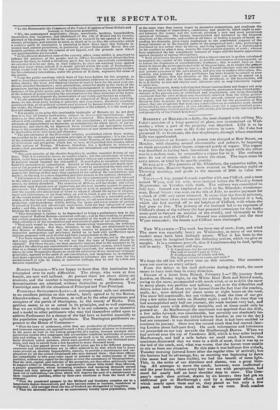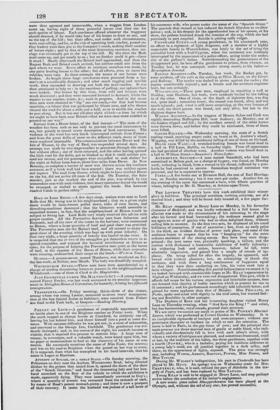THE 1VcaT urn.—The week has been one of snow, frost,
and wind The snow was especially heavy on Wednesday, as many of our town readers must have been feelingly aware. What it has been in the country, may be imagined from the following notices, which we give as samples. It is a common proverb, that if Candlemas-day be foul, spring will be early. The Scotch still say- " If Candlemas-day be wet and foul, The half of winter's past at Yule ; If Candlemas-day be bright and fair, The half of winter's to come, and mair."
We hope the old law will prove true on this occasion. Our ancestors were not unwise on every subject. From the delays in the mail deliveries during the week, the snow seems to have been deep in every direction.
Extract of a letter from Bristol, February 1.—" My journey from London, on Monday night, by the White Hart :Bath and Bristol coach, owing to the snow, accompanied with much wind, so as to drift the snow in many places, was perilous and tedious ; and as to the difficulties and delays, some idea of them may be formed from the fact that the coaches, mails, Ste., were delayed for about seven or eight hours on the road. The snow fell continually, but not violently, from the time of our get ting a few miles from town on Monday night; and by the time that we had accomplished only half our journey, the roads became very bad, and the regular route with difficulty traceable, and at times could only be guessed at. At Marlborough the coachman was apprized that the drift, a few miles forward, was considerable, but certainly not absolutely im- passable, for the Blue coach (which leaves London at one in the day) had not returned : it was therefore inferred that it had been enabled to continue its journey. Ours was the second coach that had started (leav- ing London about half-past five). On such information and inferences we proceeded on our way towards the Marlborough Downs. When we had arrived near the top of Cowdown Hill; which is four miles beyond Marlborough, and half a mile before we could reach Kennett, the coachman discovered that we were in a drift of snow, that it was up to the bed of the coach, and, what was worse, that the horses were unable to stir us from our situation. By this time it was half-past five o'clock, Tuesday morning (several hours after the regular time of arrival); but the lateness had its advantage, for, as morning was beginning to dawn (the moon had not been visible), we had the benefit of some light. This, in the midst of our distresses and alarms, was a great bless- ing. All attempts to move the coach, however, were ineffectual ; and the poor horses, whose every hair was wet with perspiration, had stood for nearly half an hour shoulder deep in snow. The Com- pany's coach then arrived, drawn by six horses; they had got-an additional pair at Marlborough ; and by a desperate effort, and which nearly upset them and us, they passed us but only a few paces, and -were then stuck as fast as we were. Both coaches were thus aground and immoveable, when a waggon from London came up; having eight of those powerful horses that they use for such species of labour. Each coachman offered whatever the waggoner should demand, if he would take four of his holies to draw es out, and to the top of the hill ; but their offers, and under such circumstances, were unavailing, and he, at the 'risk of upsetting both coaches, passed on. Our leaders were then Put to the Company's coach, making their number of horses eight ; and by dint of the most distressing exertions, that car- riage was eventually got to the top of the hill. By this time the Bath mail came up, and got nearly to us ; but no further could it get—there it stuck ! Shorly afterwards the Bristol mail approached, and then the Regent Bath and Bristol coach arrived, but neither could stir from the spot where we were. Every effort to extricate ourselves was made, by one party lending horses to the other; but all efforts, even to move the vehicles, were vain. In these attempts the traces of our horses were broken. At length three large cart-horses were procured from a far- mer's at a considerable distance ; and after much tugging and terrible work, they succeeded in drawing out both the mail-coaches. It was then attempted to help us : in the exertions of pulling, our splinter-bars were broken. Our horses by this time, from cold and fatigue. were much distressed ; and they were conveyed forward to Kennett, while the repairs to our coaches, traces, &c., were in progress. And in the mean time men were obtained to "dig" out our coach,—for that had become requisite,—a labour that was performed by fifteen men, and who thence cleared the road for about a mile and a half, so as to enable the coaches to pass along. But it was not till after eight o'clock—a time by which we ought to have been near Bristol—that we were once more enabled to proceed on our way."
Extract from a Dover letter, of the 2nd instant.—" The state of the weather has been such as not only to prevent the usual intercourse by sea, but greatly to retard every description of land conveyance. The violence of the wind has very much interrupted arrivals from France ; and from the great drifts of snow on the different roads, many of them were rendered impassable. The communication between Dover and the Isle of Thanet, by the way of Deal, was suspended several days. An attempt was made by two stage-coaches to penetrate through the snow, but without effect ; one of them returned, and the other having quitted the high road for the fields, got so blocked up that it could neither pro- ceed nor retreat, and the passengers were compelled to seek shelter for the night at Solton farm-house, about four miles from Dover. At New Romney, as complete a barrier of snow was thrown across the southern entrance, as if a brick wall had been erected ; there was neither egress nor ingress. The mail from thence, which ought to have reached Dover on the 1st, did not arrive till noon of the 2nd. On Tuesday, the Sala- mander, just as she reached the end of the pier, was struck by two tremendous seas with such violence, that many spectators feared she would be swamped, or dashed to atoms against the heads. She however reached Calais in perfect safety."



























 Previous page
Previous page